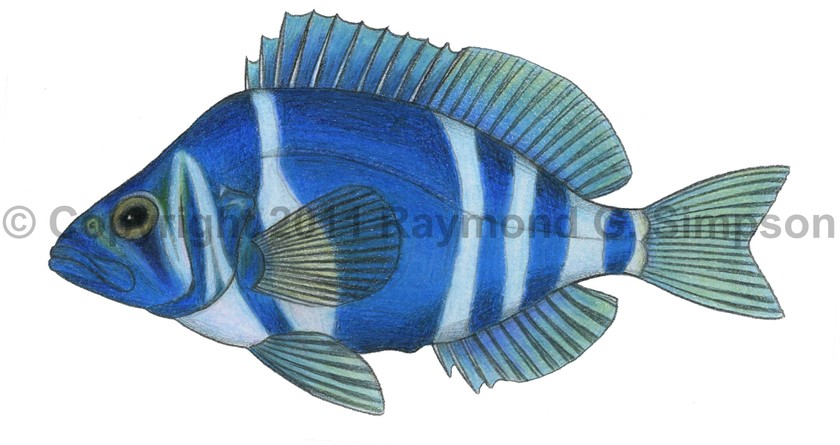
Common Name
Indigo Hamlet
Year Described
Poey, 1851
Identification
Dorsal Fin: X, 14-17
Anal Fin: III, 7
Pectoral Fin: 13-14
Pelvic Fin: I, 5
Lateral Line: 48-53
Gill Rakers: 17-23 on first arch
Body robust and laterally compressed. Steeply sloping head profile. Dorsal fin continuous with no obvious notch between spiny and soft portions. Anal fin much smaller than dorsal fin. Caudal fin is typically truncate to slightly emarginate. The mouth is large and terminal, with the lower jaw often slightly projecting. Jaws bear villiform teeth, with an inner band of enlarged canines. Scales are ctenoid and cover the body and much of the head. The lateral line is continuous and curves gently along the upper body.
Color
Base color of body whitish to pale blue, becoming bright blue on the head. There are four or five broad indigo blue bands on the body: one immediately behind the opercle, another very wide mid-body band, two thinner bars behind that, and another small one on the caudal peduncle. A blue triangular eye band is usually prominent, with bright white borders on either side. The fins are pale blue, becoming dark blue on the anterior dorsal fin.
Size
Maximum size to 16.1cm SL..
Habitat
Coral reefs from 3-54m.
Range
Bahamas to the Caribbean Sea.
References
Lobel, P.S. 2011. A review of the Caribbean hamlets (Serranidae, Hypoplectrus) with description of two new species. Zootaxa No. 3096: 1-17.